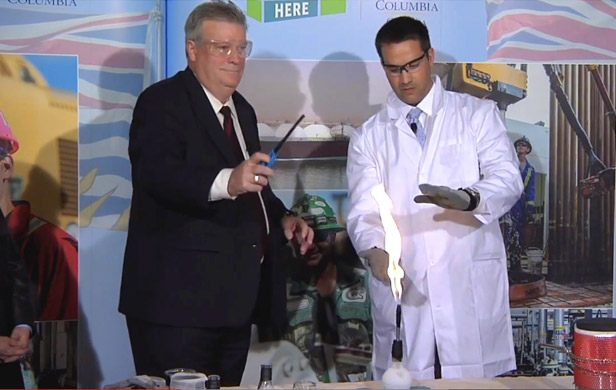
The BC government is worried it can’t control the way fracking and liquefied natural gas (LNG) are being criticized through social media, documents obtained through a Freedom of Information request reveal.
As a result, the Liberal administration fears losing the “social licence” required to advance its LNG strategy – the core policy of its recent election platform and economic vision.
The June, 2014 briefing note (view full document here) was dug up by Propeller Strategy, a non-profit group with a focus on environmental and public interest issues in BC. Prepared by staff for Minister of Natural Gas Development Rich Coleman, it compares criticism of fracking with the kind of fake news and tweets that surrounded the Boston Marathon Bombing several years ago.
“Misinformation about hydraulic fracturing (fracking) technology, water usage and greenhouse gas emissions relating to natural gas extraction and LNG production facilities is rampant in the community, particularly in social media,” the briefing note states.
[quote]Allowing this kind of “framing” to occur is not in the public interest as social licence is eroded. [/quote]
“Cascade of misinformation”
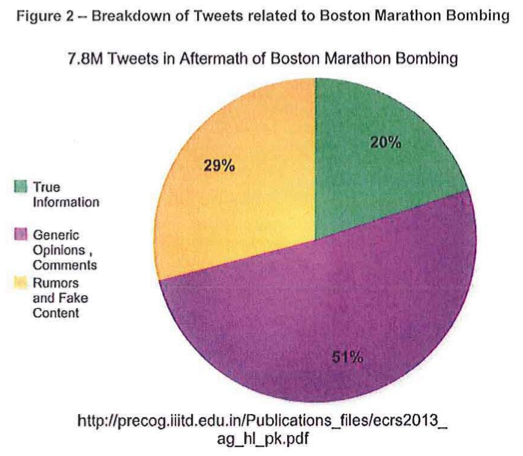 The document uses the Boston Marathon Bombing as an example of how quickly misinformation can spread through sites like twitter and facebook. In that particular incident, thousands of false tweets muddied the public’s initial understanding of the situation.
The document uses the Boston Marathon Bombing as an example of how quickly misinformation can spread through sites like twitter and facebook. In that particular incident, thousands of false tweets muddied the public’s initial understanding of the situation.
“Part of it is people wanting to be part of the story, but part of it is spammers and hoaxers trying to cash in on the fact that people are talking about this,” UBC media professor Alfred Hermida recently explained to The Georgia Straight’s Charlie Smith in a story on social media hoaxes.
The Ministry of Natural Gas memo describes how quickly a single tweet, being picked up by twitter celebrities with large followings, can spread through “thousands of re-tweets” – creating a “cascade of misinformation.”
In the words of Winston Churchill…
Bringing it back to the government’s messaging challenges around fracking, the briefing note warns, “It’s rather difficult to win back the public once the misinformation is etched into the memory of British Columbians.”
[quote]As Winston Churchill pointed out: “A lie gets halfway around the world before the truth has a chance to get its pants on.”[/quote]
But is that a fair description of the social media discourse surrounding fracking and LNG in BC? The way the document reads, it’s as though the government takes for granted that any discouraging words said about these industries must inherently be construed as “misinformation.”
Why all the secrecy?
It’s difficult to know how much weight the government’s concerns hold, since much of the document supplied to Propeller Strategy was redacted. The entire second page, containing specific discussion and conclusions, was whited out, leaving not a single, tangible example of the kind of false claims the ministry alleges surround fracking and LNG.
Says Stan Proboszcz, who filed the FOI request, “I’m disconcerted about what the province may be planning to do to improve the industry’s failing image, given the redactions. Why all the secrecy?”
[quote]It’s clear the province is concerned with the industry’s evaporating social licence.[/quote]
Cleanest fossil fuel on the planet?
Meanwhile, The Common Sense Canadian has been tracking and publishing on social media the evolving, peer-reviewed science related to fracked shale gas, which increasingly contradicts the government’s branding of BC LNG as the “cleanest fossil fuel on the planet”. (This proposed LNG industry would be fed by a major increase in fracking in northeast BC.)
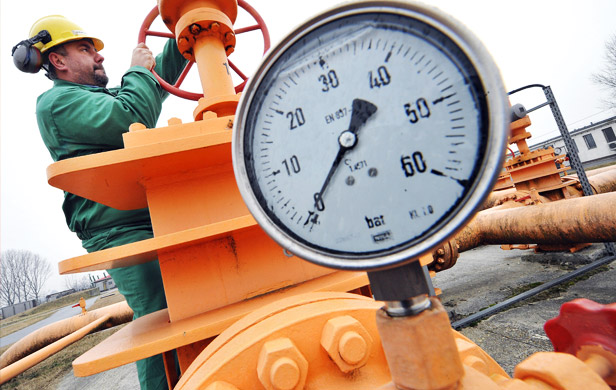
Cornell University climate scientist Dr. Robert Howarth – an acknowledged leader in the field of measuring the real climate impacts of fracking – scoffs at Premier Christy Clark’s “cleanest fossil fuel” claims. Based on his research into escaping methane gas, which is some 86 times more potent as a greenhouse gas over a 20-year period than CO2,“natural gas – and particularly shale gas – is the worst of the fossil fuels…Your premier has her facts wrong.”
That particular story was liked over 2,300 times on facebook and widely shared amongst BC users. Is this the kind of “misinformation” in social media that the ministry is referring to?
LNG would dramatically boost BC’s carbon footprint
In addition to the climate problems associated with fracked gas, “using it in LNG is probably the worst way to use it,” Dr. Howarth explains. “It takes a tremendous amount of energy to liquefy the gas to LNG, so a lot further methane emissions associated with transporting and storing the fuel.”
Studies from the Pembina Institute suggest that just the coastal LNG plants associated with the government’s plan could more than double BC’s entire carbon footprint – and that’s only factoring in a handful of the 15-plus terminals currently proposed for the province.
[quote]…even the lower end of that development scenario would produce a staggering 73 million tonnes of carbon pollution per year by 2020. For comparison, the oilsands are currently Canada’s fastest-growing source of climate pollution — but by 2020, B.C.’s LNG plans would produce three-quarters as much carbon pollution if development proceeds as hoped.[/quote]
Even the government’s own scientists have warned it about the climate consequences of its LNG vision – apparently to no avail.
Misinformation claims don’t hold water
The government is also clearly concerned about criticism of fracking’s impacts on water – criticism which, again, would seem to be prudent, based on the evidence.
In 2012, BC used close to 11 Billion litres of water for fracking – most of that drawn from the rivers, lakes and streams of northeast BC, a region already hard-hit by drought in recent years. And that’s just what was reported through government figures. Not all water extraction is properly measured or reported.
Shale gas expert David Hughes has run the numbers on what it would take to supply those LNG plants, and it means as many as 50,000 new fracked wells – close to double all the gas wells drilled in the 60-year history of the province’s gas industry.
In order to supply this LNG-driven ramp-up, he and Canadian Centre for Policy Alternatives researcher Ben Parfitt figure “a very conservatively estimated 582 billion litres of water would then be polluted and removed from the hydrological cycle.”
On an annual basis, that’s equivalent to all the water used by the city of Calgary.
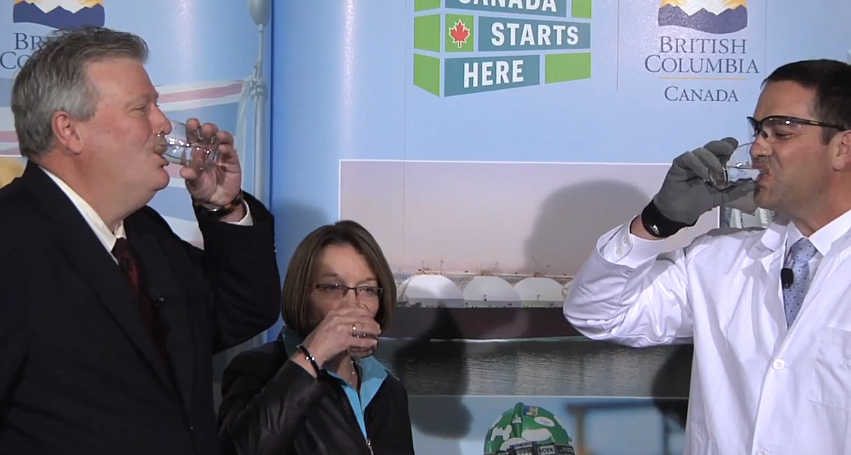
Coleman and Clark have also made bold claims as to the safety of BC’s fracking with regards to water, but cracks have begun to form in those arguments. In a 2013 Georgia Straight op-ed, Coleman made the following claim: “The net result of both our strong regulatory framework and our geology is that B.C.’s water supply is protected and safe. It has never been contaminated as a result of hydraulic fracturing.”
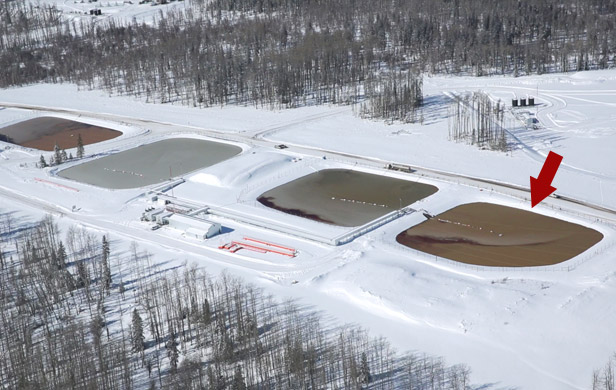
Yet, one week earlier, The Globe and Mail had broken the story of a leaking tailing pond near the community of Hudson’s Hope – owned by Talisman at the time (now by Malaysia’s Petronas). As The Common Sense Canadian went on to unearth, this pond, containing 30 million litres of contaminated frack water, was leaking into the surrounding soil and groundwater for up to six months before the company went public about it.
The eventual cleanup operation required the removal of some 5,000 cubic metres of contaminated earth.
Minister Coleman may argue on a technicality that there is no evidence of that contamination reaching BC’s public drinking water supply – though that is not even what he specifically said.
We also learned in August that unnamed companies had been illegally dumping contaminated fracking wastewater into the Dawson Creek municipal water treatment system.
All of these stories received considerable sharing and commenting through social media. Each of them based on thorough research and the best available scientific knowledge. And this is on top of a growing body of evidence from across Canada, the United Sates and other fracking jurisdictions of the risks of water and air pollution from shale gas.
Does public have better BS-detector on social media?
With over 1 billion facebook users globally and half a billion tweets sent each day – spanning a broad demographic range – it is becoming increasingly difficult for government and industry to control the public discourse around issues strictly through conventional media.
To this end, the BC Liberal Government is making an effort to engage with the social media space – deploying twitter feeds, hashtags, flickr photo streams, and youtube videos of their own.
Minister Coleman actively uses Twitter, but doesn’t appear to be gaining the kind of “message” traction he’d like. Perhaps it’s because his tweets smack of the very propaganda he accuses his detractors of engaging in.
“In conventional media, it’s the big media companies which get to decide whether messages get circulated or not, and the audience doesn’t have a say,” explains Shane Gunster, Graduate Program Chair at the SFU School of Communication. “So there isn’t really any feedback mechanism (other than yelling at the television) for people to express their opinion.”
[quote]In social media, however, the success of a campaign depends upon that feedback: people are the gatekeepers in terms of deciding if and when messages are circulated through their social networks. And in that context, PR – especially when it is recognized as PR – is just not going to have much traction because most people don’t want to be perceived as industry or government hacks…I think it’s fair to say there’s a fair bit of scepticism, and even hostility when people see government or industry spending millions of dollars to shape public opinion on issues like pipelines or fracking. [/quote]
A brief perusal of Minister Coleman’s twitter feed reveals a series of relatively one-dimensional PR statements and offhand dismissals of critics:
When legitimate questions began being raised about plans to outsource to India and China some of the jobs promised to British Columbians from the LNG industry – one of the key justifications for the whole program – Coleman fired back:
Social media driving social change?
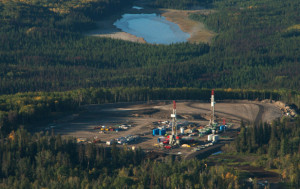
It’s clear from this briefing note that the government is worried about the impact social media are having on its LNG vision. And these fears may be well-justified. These media contribute to the erosion of social licence for the industry in several ways.
Not only do they furnish users with information and foster lively dialogue, but sites like facebook have become key tools for organizing public demonstrations, advertising town hall meetings and other forms of real-world protest of the government’s plans.
We have already seen where largely social media-driven campaigns for telecommunications reform and Internet privacy protection have forced policy changes from government. From viral petitions to facilitating public comment in environmental review processes, to calling out public officials, the range of powerful tools social media offers to citizens is only growing.
So while Rich Coleman and company appear to recognize the problem, solving it is very different matter, especially if the social media they dismiss as mere misinformation actually turn out to bear some truth – the inverse of Winston Churchill’s statement.
In other words, in this scenario, the truth gets halfway around the world before the government’s PR flacks get a chance to put their pants on.
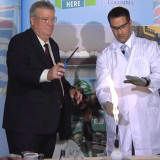




The BC government runs on misinformation and no doubt if anything the party is wondering what the odds are the public will catch on.
Ha, it might interest anyone to google search the topic of “Peer-Reviewed Research shows contamination from Fracking”.
and for that matter, you might do a google search on the very topic of the Boston Bombing titled: “Boston bombing mock drill becomes a false flag operation”
There is as much of a difference between mainstream news versus internet investigation….as between corporate governance versus a government for the interests of the general public.
Thank you! You made my day. The other issue that no one seems to talk about here is that it seems that areas with a lot of fracking are having more earthquakes, even if they have never had them before, and are not typically in an earthquake zone. Some scientists have attributed this to fracking. We are alreaedy in an earthquake zone. I guess this falls under opinion in the pie chart, but I would think we should exercise the precautionary principle here. The whole fossil fuel thing is a “wrong way, turn back!” kind of venture, and the sooner we obey the signs, the shorter the route back to sanity, alternative energy and energy conservation.
Why are we wasting time arguing about these non-renewable and environmentally-questionable resources when we could be putting time, energy and money toward renewable and sustainable energy sources? Many countries around the world are beginning to embrace this. We are like dinosaurs plodding along in “Canada” – a land once envied for its progressiveness, now demoted by Harper and his backroom corporate pimps to a #50 position on the scale of environmentally-responsible countries. You – Harper, and you, Christie Clark are an embarrassment to those whose vision includes a sustainable planet.
The Darker it gets the easer it becomes to see the light. I’m reminded of sales men drinking (round up) to convince farmers it’s safe. Sadly some people will believe that we need fossil fuel to keep our economy on track. My question is why do we want to be on track to global melt down. Our economy needs to change, so better start now. Oil people are going to be left in the dust. even Rockefeller has divested.
So let me get this straight Damien…are you saying that there is no misinformation about LNG, fracking, etc. being spread through social media by those who oppose the fossil fuel industry?
I noted your statement “…if the social media they dismiss as mere misinformation actually turn out to bear SOME truth…” with some amusement. From this comment (and your article) it would appear that you are okay with partial truths and almost-accurate information if it supports your position in the debate.
What a load of …! That little demo might be impressive only to real fools. What’s your point? That CH4 burns and is a gas – we all know that. Resort to fracking and we will block you. Stay with traditional method if you want OUR gas.
How does water get removed from the hydrological cycle?? water is water it evaporates and rains we are all surrounded by it , so if its polluted …. we are surrounded!
If the present government is expressing consternation about losing social license re LNG and fracking then I am of the opinion that social license has already been lost.
In reality I don’t believe the present government ever had social license to go ahead with these types of projects, LNG, pipelines or IPP’s.
This is a government that takes note of nothing until such time as it is too late. This is a government that blatantly breaks the law and then abuses it power in the leg to make new law so the government is shown to being in cooperation with said law.
This is an excellent and informative article. Very telling regarding how our politicians regard free speech and open debate. Propaganda interference and utilizing taxpayer dollars to do so is disturbing. It is important for the public to communicate the science that governments and industry keep from us. In one internet videotape that I discovered of an extensive talk given to a pro fracking group (Joint Landowners Coalition of New York – JLCNY) by Cornell Geosciences Professor, Dr. Lawrence Cathles, discussed (in addition to pro economic arguments targeted to this audience) that roughly (from my recounting of the information) 80 per cent of freshwater used in the fracking process does not return to the surface and is lost to the local water source and hydrological cycle forever! Of the returning 20 per cent, about 33 per cent was reported to be contaminated fracking brine. The risks were primarily associated with leakage from casing cracks and leaching from shallow shale plays. One of the resulting contaminants is radium that can be taken up in human bones like calcium. (Earthquakes have since been scientifically connected as well). This information is all any rational mind should need to understand that the risks posed to human and environmental health from this technology do not outweigh short term economic benefits.
This PR stunt by the BC Gov truly misses the point. Concerned citizens are not worried if we can drink LNG water. We are concerned about upstream events and the fracking water. Let’s get some politicians in the field scooping water from fracking wells. Then I’ll be impressed.
Tyee has a great article on how much we subsidize the Oil and Gas Industry
“The reorganization, by its leader’s own reckoning, reduces Kinder Morgan’s taxes payable by more than $20 billion over 14 years.”
http://thetyee.ca/Opinion/2014/11/17/Tran-Mountain-Pipeline-Investments/
This century is all about water (clean water). Look what is happening in California (one of the worst droughts in recent history) and the Oil and Gas industry has been dumping polluted water into clean aquifers. Australia (Drought, Fire, Heat wave) with record Temperatues (almost 3 degrees higher in Brisbane) and the Prime Minister thinks to tackle climate change is lower taxes and more jobs. Most of the places where tracking takes place have clean water shortages. You can live a long time without oil but 3 days without water. Why isn’t the whole south of the US solar like germany. The costs are so low now for panels you wouldn’t have to subsidize it like we do Oil and Gas. This tracking is very similar to the Yukon gold rush. The first few wells were prosperous but the real money is in the flipping the land and supplying the goods (Chesapeak and Koch Brothers). A bit off topic but does anybody know what percentage of wheat in the prairies is treated with Roundup just prior to harvesting. Are we becoming allergic to gluten or the chemicals they spray on the wheat. Keep up the great website.Keep the truth flowing.
The BC Govt is concerned about misinformation about LNG, which they’ve claimed will clean the air and pay off BC’s debt. Umm, ok. Whatever.
LNG is at −162 °C. If there was any in that water it would have been frozen. Nice try Coleman I don’t think you would drink fracking water
My , how ironic.
Minister Coleman doesnt mind when the “mainstream media ” is getting HIS message across but when the “new” mainstream “e-media” doesnt follw his train of thought……its a whole new ball game.
Welcome to the 21st century Rich.
The truth is far easier to find than ever before.
The pleebs arent so compliant anymore.
Get used to it.
Keep putting it out there Damien. Thank you.
GFH
If government wasn’t so often caught out in lies, they wouldn’t have to be so worried about people disseminating information. They would be able to use Social Media productively. Government can’t, and shouldn’t, control what people see and think. We are quite capable of researching the data and coming to our own conclusions. In the case of fracking, pipelines, tankers using highly dangerous routes through ecologically sensitive areas and coal trains polluting the route from coast to coast, our governments have been shown to be completely cavalier about the public health and safety.
How can the government lose something [social license] that it has never had?
Very thought provoking. Their shell is cracking.
Hey Richie ;why don’t you and helmet head Bond drink some of the stuff they are jamming into the ground(,that won’t freeze at minus 40),to get the natural gas out…now that would be fun to watch…
Those stupid voters can wreck the post political lobbying income for use politicians.
John, ? What were you trying to say?
I think it was sarcasm with an extra “e”!
“Those stupid voters can [are] wreck[ing] the post-political lobbying income for us [not “use”] politicians.”
Interesting piece.